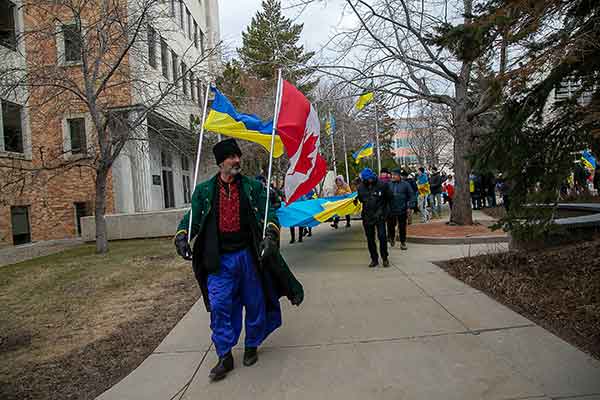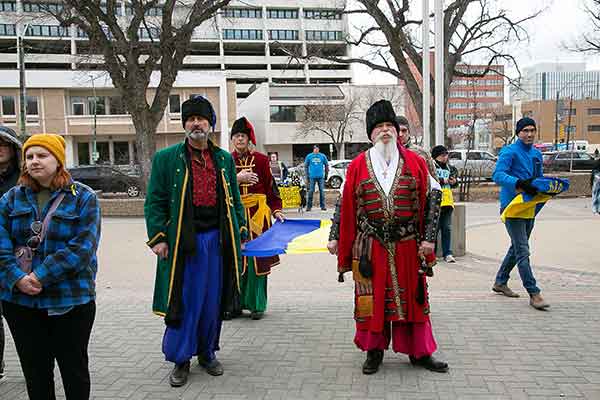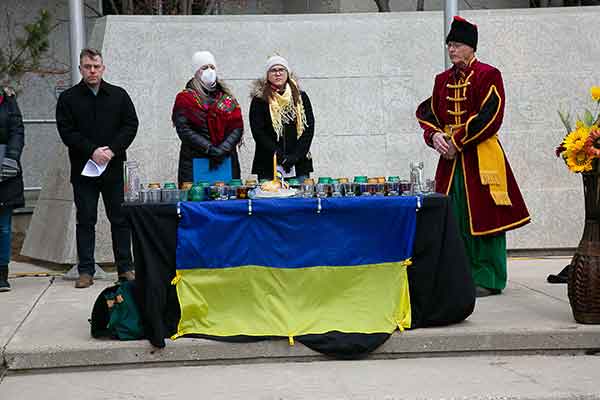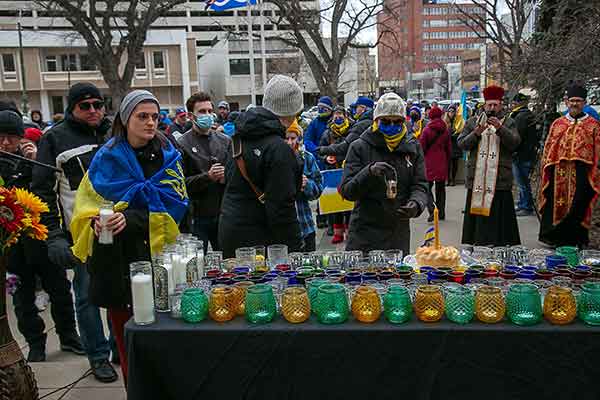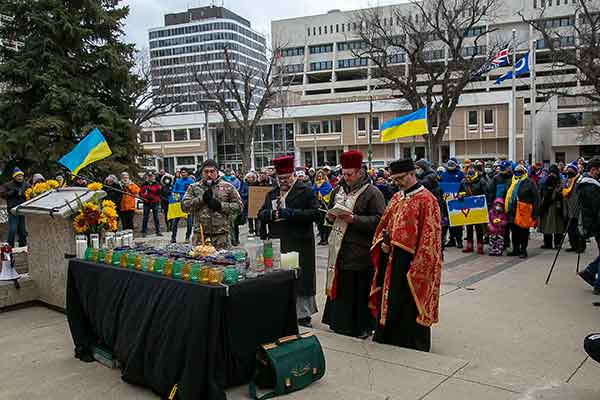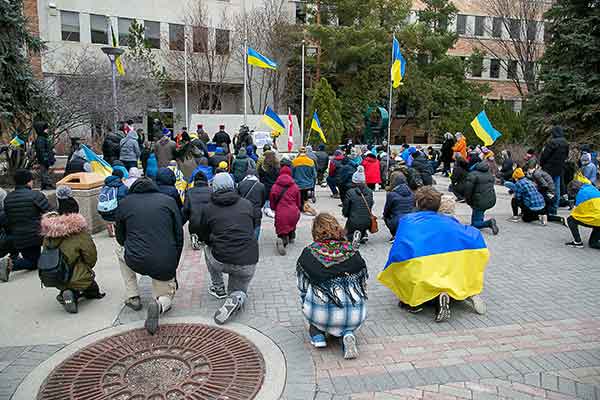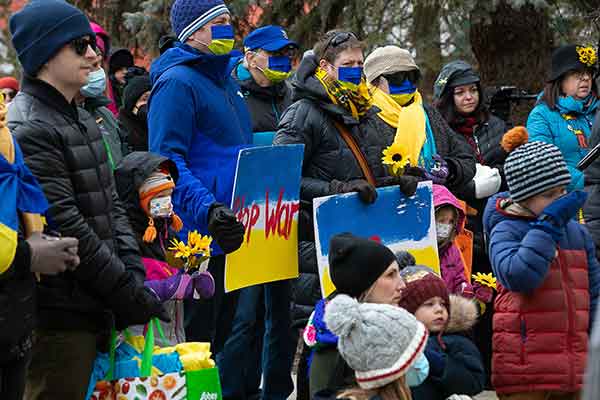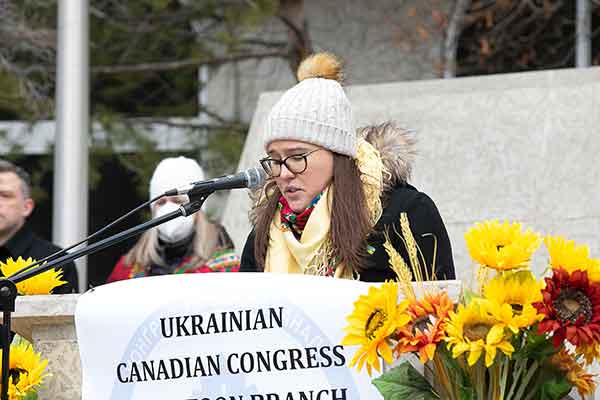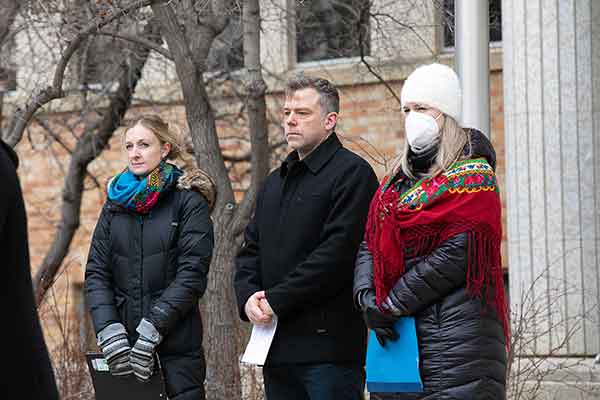On April 10th, 2022 at City Hall, UCC-Saskatoon held a vigil for the victims of the recently discovered atrocities in Bucha, Ukraine.
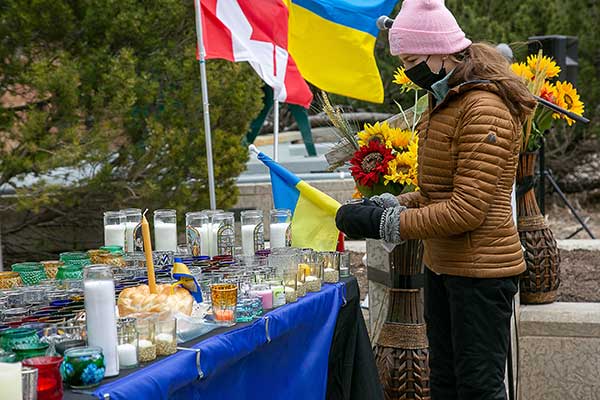
Vigil and Rally for Ukraine. The rally pictures were taken by Karen Sopotyk-Pidskalny.
Among the speakers was Dr. Foty-Oneschuk, who delivered a moving speech on the historical context of the Ukrainian-Russian war. Below is a transcript of the speech.
Доброго дня. Good day.
I was asked to speak today about the historical context of the Ukrainian-Russian War. Anyone familiar with this part of the world and its history knows that this is something that cannot be easily described. Rather, this is a war that has been centuries in the making. My attempt to speak to this topic will instead be done through a historical lens exploring what comprises the Ukrainian spirit – the very thing leaving much of the world in awe these last many weeks.
Though not a trained historian, my studies and subsequent teaching in Ukrainian language and culture have been inextricably linked to knowing Ukraine’s history. In fact, scholars in virtually every discipline connected to Ukrainian Studies inevitably have to talk about Ukrainian history when teaching their students. Though complicated and often painful, our history makes up the fabric of our being. It touches each part of us, it colors everything we do, it makes our struggles better understood, and makes our triumphs even more cherished.
The rhetoric of “brotherly nations” is widespread but is nothing more than a remnant of Russian imperial and Soviet propaganda. We have all seen the memes circulating these last several weeks, with narratives about the era of medieval Kyivan Rus’, with Ukraine’s capital Kyiv adorned with golden-domed churches and monasteries signaling already a great civilization, pitted against the boggy marshes of a future Moscow, depicting its non-existence. Perhaps my favorite of these was the one depicting a Kyivan Rus’ citizen pointing to the northeast, asking, “what’s there?” His ruler, the Kniaz, responds “mud.” The words “Історію не переписати” appear at the bottom of the frame – “history cannot be re-written.”
The historical context of the Ukrainian-Russian war is a continuum of the latter’s insistence to claim what is simply not theirs. This obsession has existed since the 13th century and has been a constant throughout the various iterations of Muscovy, the Russian Empire, the Soviet Union, and the current Russian Federation. Ever the bigger Goliath to Ukraine’s David, Russia has coveted the fertile чорнозем – the black earth soil that has given Ukraine the honorable title of the “breadbasket of Europe” since the early decades of the 20th century. Russia has coveted Ukrainian minds, and leaders in the sciences, the arts, and technology. They have tried, incessantly, to take this, which is not theirs – and when that fails, they try to break it.
They abolished the fierce Kozak warriors, who valiantly fought for Ukraine’s freedom in the Early Modern Era, and who categorically rejected Muscovite subjugation. They did this thinking that it would extinguish the fighting spirit of Ukrainians.
They ruined Ukraine’s greatest minds in the 18th and 19th centuries with their persecutions and exiles to the furthest reaches of their stolen empire. They did this thinking it would silence Ukrainian voices and the “крик душі” – the scream of their souls.
They forcibly moved Ukrainians off their land into far-away, barren places, prompting others, like many of our ancestors, to leave in search of a better, safer future. They did this thinking it would sever the sacred relationship we have with our Україна – with the steppes, the mountains, the coast, the forests, and the джерельна вода – the life-giving waters.
They committed a genocide, the Holodomor, to punish the Ukrainian resistance to collectivization and the quest for national identity, wiping out the heartland of the Ukrainian steppes and re-populating it with their own. They did this thinking it would instill a fear and silence that would keep Ukrainians obedient.
They continued to purge the intelligentsia, make the Ukrainian language illegal, make Ukrainian cultural and religious traditions and ways of life disappear. They said Ukrainians were “малороси” – “Little Russians,” believing that they could take their national identity, their roots, from them. They did this thinking it would make Ukrainians forget.
Even after the fall of the Soviet Union and the dawn of Ukrainian independence, they continued to interfere, to undermine, and to terrorize. They did this thinking it would turn back time.
Students often ask me – why is so much of Ukrainian folklore – the poems, the stories, the songs – why are so many of them about freedom, about the fighting spirit, about one’s love for Ukraine? Why do Ukrainians around the world, removed from the ancestral homeland by generations, feel this connection so deeply? The simple answer is – precisely because of Ukraine’s history. From the Kozak songs written 500 years ago, to the song written in honor of the Sich Riflemen of World War I, Ой у лузі червона калина, which has gone viral since this war began – all of these lyrics are still eerily relevant. In fact, the themes and imagery in some of these age-old songs depict things occurring right now. Undoubtedly, these lyrics reflect a narrative that will now finally see its end on Ukrainian land.
What the world has witnessed these last six weeks is a historical reckoning nearly a millennium in the making. The fighting spirit has not been extinguished. The voices have not been silenced. The desire for the territorial integrity of every last millimeter of Ukrainian land has not disappeared. The courage and determination to stand in opposition to the colonizer, the aggressor, has not been dampened. Our collective memory of all of this history, despite countless attempts at erasure, has not forgotten. And the future of Ukraine, of its children’s children, is one of democracy and the ideals of self-determination.
Even in the wake of these latest horrific genocidal atrocities in Mariupol’, in the Kyiv region, in the Kharkiv region, and all of the similar atrocities yet to be discovered in currently occupied regions of the country, one thing remains certain – Ukrainians were never meant to survive, yet they did.
History cannot be re-written but, as well all know, it does have a tendency to repeat itself when its lessons go unlearned. The peace-loving, freedom-craving Ukrainian nation has not once gone looking for conflict with their eastern neighbor, and every attempt at Ukraine’s subjugation has led to an even stronger union among its citizens. In fact, it can be said that no one has ever united Ukrainians more than Mr. Putin himself.
According to Kremlin rhetoric, Ukrainian history, Ukrainian language, and Ukrainian culture are fakes – they do not have a right to exist. Therefore, Ukrainians, those courageously living this nightmare in Ukraine and even the millions comprising the Ukrainian diaspora around the world, who stand in fierce solidarity with our brothers and sisters in Ukraine – none of us have a right to exist.
Yet we do. And we will. Навіки вічні.
Вічна і світла пам’ять загиблим.
Слава Україні!
Dr. Nadya Foty-Oneschuk
April 12, 2022
Saskatoon
Glory to Ukraine! Glory to Heroes!
